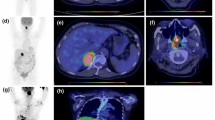Abstract
Adult T-cell leukemia–lymphoma (ATL) is a distinct T-cell malignancy caused by human T-cell leukemia virus type-1; the prognosis is very poor. Mogamulizumab (Moga), an antibody drug for CC chemokine receptor type 4, has been introduced for the treatment of ATL. However, the prognosis of relapsed or refractory ATL remains poor and the characteristics of patients who derive clinical benefit from treatment with Moga remain poorly understood. We analyzed the associations of clinical factors with the outcome after Moga treatment. Forty-five patients treated with Moga monotherapy were evaluated. The median age of the patients was 69 years, and 40% were female. The median overall survival (OS) time was 17.6 months and the 2-year OS rate was 43.2%. Number of prior therapies and response to prior therapy were predictive clinical features in univariate analysis for OS. Performance status, corrected serum calcium level, serum lactate dehydrogenase level, Japan Clinical Oncology Group-prognostic index (PI), and simplified ATL-PI at Moga treatment were also associated with the prognosis after Moga monotherapy. Improved understanding of the clinical factors predicting the prognosis after Moga may contribute to improved treatment strategies for ATL.




Similar content being viewed by others
References
Shimoyama M. Diagnostic criteria and classification of clinical subtypes of adult T-cell leukaemia-lymphoma. A report from the Lymphoma Study Group (1984-87). Br J Haematol. 1991;79:428–37.
Tsukasaki K, Utsunomiya A, Fukuda H, Shibata T, Fukushima T, Takatsuka Y, et al. VCAP-AMP-VECP compared with biweekly CHOP for adult T-cell leukemia-lymphoma: Japan Clinical Oncology Group Study JCOG9801. J Clin Oncol. 2007;25:5458–64.
Taniguchi H, Imaizumi Y, Makiyama J, Itonaga H, Ando K, Sawayama Y, et al. Outcome of patients with relapsed/refractory adult T-cell leukemia-lymphoma after salvage therapy. Rinsho Ketsueki. 2013;54(12):2159–66.
Yoshie O, Fujisawa R, Nakayama T, Harasawa H, Tago H, Izawa D, et al. Frequent expression of CCR4 in adult T-cell leukemia and human T-cell leukemia virus type 1-transformed T cells. Blood. 2002;99:1505–11.
Ishida T, Utsunomiya A, Iida S, Inagaki H, Takatsuka Y, Kusumoto S, et al. Clinical significance of CCR4 expression in adult T-cell leukemia/lymphoma: its close association with skin involvement and unfavorable outcome. Clin Cancer Res. 2003;9(10 Pt 1):3625–34.
Ishida T, Joh T, Uike N, Yamamoto K, Utsunomiya A, Yoshida S, et al. Defucosylated anti-CCR4 monoclonal antibody (KW-0761) for relapsed adult T-cell leukemia-lymphoma: a multicenter phase II study. J Clin Oncol. 2012;30(8):837–42.
Iyama S, Sato T, Ohnishi H, Kanisawa Y, Ohta S, Kondo T, et al. A multicenter retrospective study of mogamulizumab efficacy in adult T-cell leukemia/lymphoma. Clin Lymphoma Myeloma Leuk. 2017;17:23–30.e2.
Sekine M, Kubuki Y, Kameda T, Takeuchi M, Toyama T, Kawano N, et al. Effects of mogamulizumab in adult T-cell leukemia/lymphoma in clinical practice. Eur J Haematol. 2017;98:501–7.
Tokunaga M, Yonekura K, Nakamura D, Haraguchi K, Tabuchi T, Fujino S, et al. Clinical significance of cutaneous adverse reaction to mogamulizumab in relapsed or refractory adult T-cell leukaemia-lymphoma. Br J Haematol. 2017. https://doi.org/10.1111/bjh.14634.
Ishida T, Fujiwara H, Nosaka K, Taira N, Abe Y, Imaizumi Y, et al. Multicenter phase II study of lenalidomide in Relapsed or recurrent adult T-cell leukemia/lymphoma: ATLL-002. J Clin Oncol. 2016;34:4086–93.
Fukushima T, Nomura S, Shimoyama M, Shibata T, Imaizumi Y, Moriuchi Y, et al. Japan Clinical Oncology Group (JCOG) prognostic index and characterization of long-term survivors of aggressive adult T-cell leukaemia-lymphoma (JCOG0902A). Br J Haematol. 2014;166:739–48.
Katsuya H, Yamanaka T, Ishitsuka K, Utsunomiya A, Sasaki H, Hanada S, et al. Prognostic index for acute- and lymphoma-type adult T-cell leukemia/lymphoma. J Clin Oncol. 2012;30:1635–40.
Yamada Y, Tomonaga M, Fukuda H, Hanada S, Utsunomiya A, Tara M, et al. A new G-CSF-supported combination chemotherapy, LSG15, for adult T-cell leukaemia-lymphoma: Japan Clinical Oncology Group Study 9303. Br J Haematol. 2001;113:375–82.
Tsukasaki K, Tobinai K, Shimoyama M, Kozuru M, Uike N, Yamada Y, et al. Deoxycoformycin-containing combination chemotherapy for adult T-cell leukemia-lymphoma: Japan Clinical Oncology Group Study (JCOG9109). Int J Hematol. 2003;77(2):164–70.
Ishida T, Utsunomiya A, Jo T, Yamamoto K, Kato K, Yoshida S, et al. Mogamulizumab for relapsed adult T-cell leukemia-lymphoma: updated follow-up analysis of phase I and II studies. Cancer Sci. 2017;108:2022–9.
Ishitsuka K, Yurimoto S, Kawamura K, Tsuji Y, Iwabuchi M, Takahashi T, et al. Safety and efficacy of mogamulizumab in patients with adult T-cell leukemia-lymphoma in Japan: interim results of postmarketing all-case surveillance. Int J Hematol. 2017;106(4):522–32.
Acknowledgements
We thank the hematologists in the Department of Hematology, Nagasaki University Hospital, National Hospital Organization Nagasaki Medical Center, and Sasebo City General Hospital, for the diagnosis and treatment of patients with ATL. We would like to thank Editage (http://www.editage.jp) for English language editing.
Author information
Authors and Affiliations
Corresponding author
Ethics declarations
Conflict of interest
The authors have no conflict of interest to declare.
Electronic supplementary material
Below is the link to the electronic supplementary material.
About this article
Cite this article
Nakashima, J., Imaizumi, Y., Taniguchi, H. et al. Clinical factors to predict outcome following mogamulizumab in adult T-cell leukemia-lymphoma. Int J Hematol 108, 516–523 (2018). https://doi.org/10.1007/s12185-018-2509-0
Received:
Revised:
Accepted:
Published:
Issue Date:
DOI: https://doi.org/10.1007/s12185-018-2509-0




